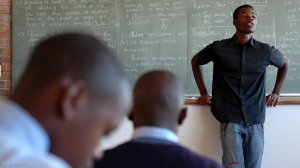- ONE: South Africa's failing education system0.48 MB
- TWO: What’s wrong with our education system?0.43 MB
- THREE: The forgotten story of state capture in education1.54 MB
- FOUR: Lessons for education reformers0.57 MB
- FIVE: Time to fix South Africa’s schools0.53 MB
Centre for Development and Enterprise (CDE) executive director Ann Bernstein said on Tuesday that in the lead-up to the 2024 general election the focus should shift to ensuring that fixing schools is a key priority in the election campaign.
CDE launched a series of five reports on South Africa’s education system, noting that South Africa has a deep crisis.
Bernstein said the education system has been compromised by corruption, cadre deployment and too many incompetent staff members.
She highlighted that voters and the media needed to force political parties to inform voters on how they would deal with cadre deployment, corruption, accountability and other pertinent issues if the country was to drive schooling performance to higher levels.
She said government’s inability to meaningfully transform basic education was one of democratic South Africa’s most grievous failures and an appalling indictment of the country’s society.
“While the President talks of a ‘silent revolution’ when celebrating matric results, the majority of young people in our schools are not learning to read, write or add,” she said, adding that change requires the right diagnosis and political will.
Bernstein stated that South Africa has a weak State and an ineffective President, and needed a new Minister of Basic Education, director-general and top team at national and provincial levels tasked to urgently move South Africa off the bottom of international tables for mathematics, science and reading.
Bernstein argued that there was very little accountability in the country’s vast education system, and this was a primary reason for teacher underperformance.
“The President speaks of a ‘silent revolution’, while the Minister talks of a ‘system on the rise’. The truth is that we face a silent crisis in our schools. South Africa has one of the worst performing education systems in the world,” Bernstein said.
BIGGEST SHOCK
South Africa achieved improvements in learning outcomes between the early 2000s and mid-2010s but Bernstein noted that this hopeful trajectory had not been sustained.
She said South Africa’s comparative performance was shocking, referring to South Africa being last or in the bottom three countries on international tests.
“Many countries poorer than South Africa outperform us in these tests including Morocco, Egypt, Georgia, Kosovo and Albania. According to the World Bank, South Africa is the world’s biggest underperformer in education among countries with a similar gross domestic product per capita,” explained Bernstein.
She said Covid-19 hugely exacerbated the many challenges already faced by the country’s basic education system, explaining that the effects of the pandemic could be seen in learning losses of around a year’s worth of schooling. Today the average 10 year old knows less than the average nine year old before the pandemic, she said.
The impact of these learning losses, especially acute in the foundation years – grades 1 to 4 – would be felt for years to come, she warned.
She said four out of five teachers in public schools lacked the content knowledge and pedagogical skills to teach their subjects. In maths, for example, proficiency levels of South African teachers (41%) rank far below that of their peers in Kenya (95%) and Zimbabwe (87%).
Bernstein added that South Africa has the highest teacher absenteeism rate of all Southern African Development Community countries.
She said to tackle the root causes of underperformance, South Africa needs an honest diagnosis of the major challenges holding it back.
“The poverty of learners and their families, the challenging environments in which many schools are located as well as ongoing infrastructural deficits all play a role. However, the critical structural issues within the education system have to be addressed to fundamentally change the way teaching and learning take place in our classrooms,” she said.
EMAIL THIS ARTICLE SAVE THIS ARTICLE ARTICLE ENQUIRY
To subscribe email subscriptions@creamermedia.co.za or click here
To advertise email advertising@creamermedia.co.za or click here











